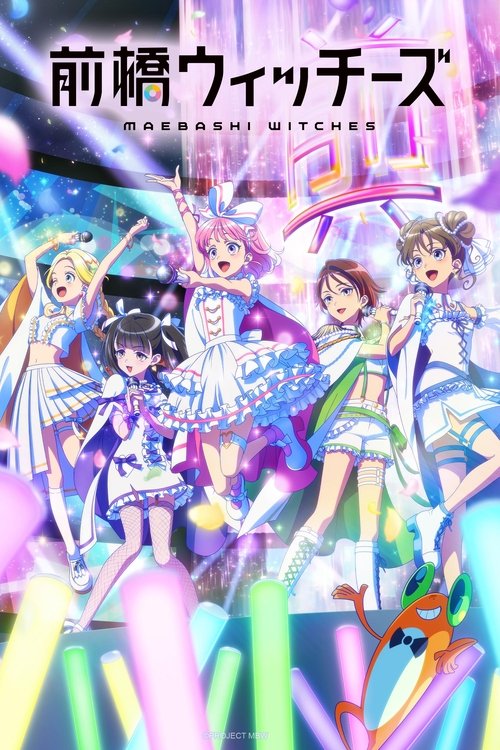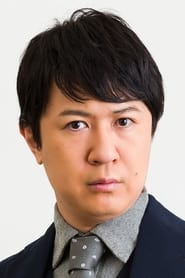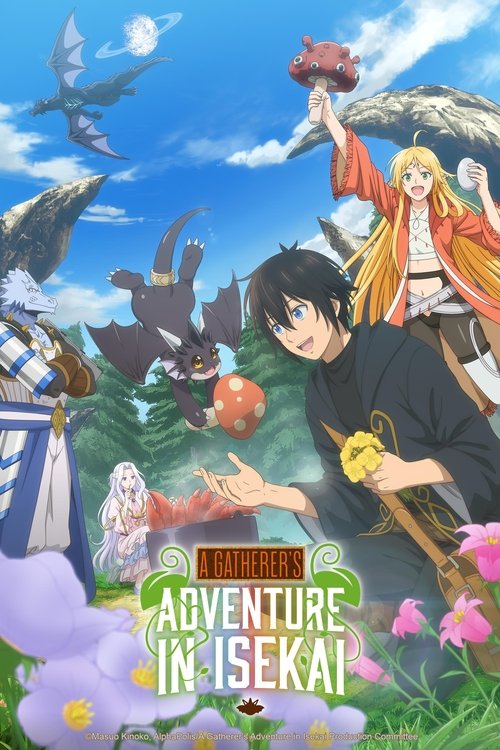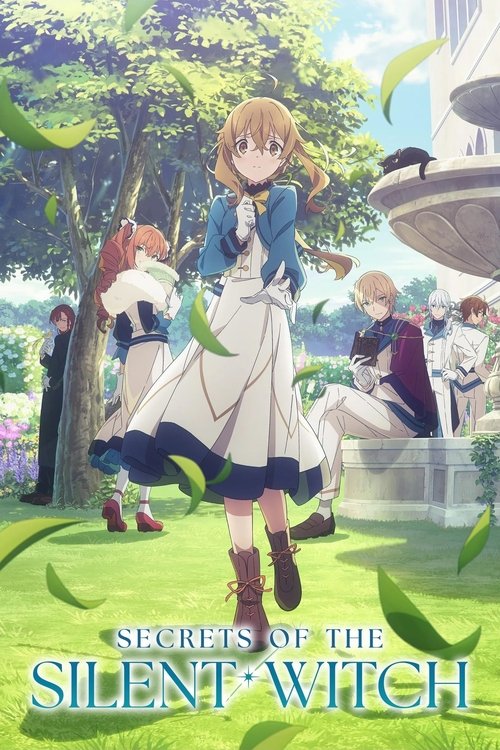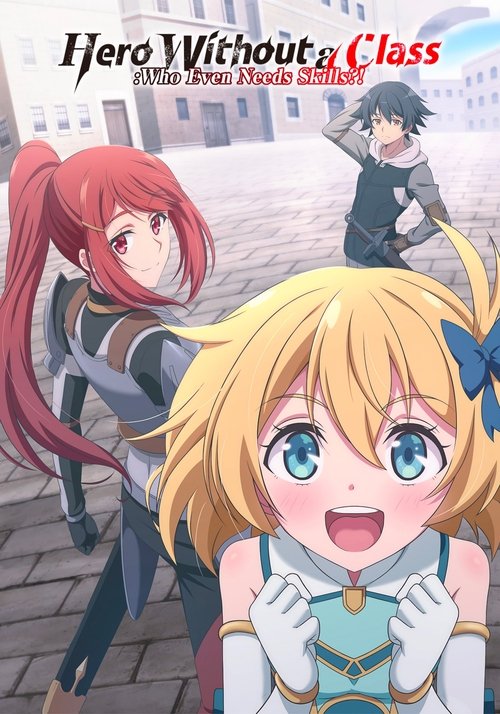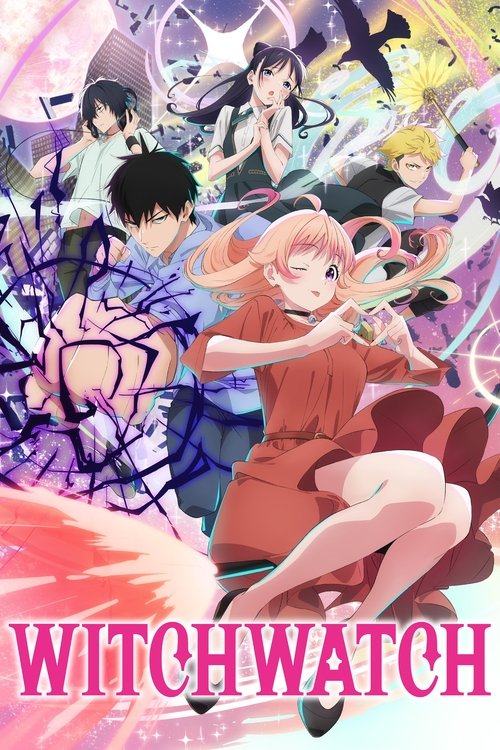
Ask Your Own Question
What is the plot?
Yuina Akagi, a first-year high school student in Maebashi City, lives a mundane and unsatisfying daily life. One day, she encounters a mysterious talking orange frog plushie named Keroppe, who invites her to become one of the "Maebashi Witches," a group of girls who grant wishes through magical means. Keroppe promises to help Yuina achieve her dream of taking the most "super max vibing" photos ever if she joins. Intrigued, Yuina accepts the offer.
Upon accepting, Yuina is whisked away through a closet door that connects to a magical space--a flower shop that materializes in a Shaft Studios-styled surreal environment. There, she meets four other girls, each embodying different personality tropes, who have also been recruited by Keroppe. The five girls together form the Maebashi Witches. Their task is to grant wishes for customers who come to the flower shop by singing, dancing, and using magic.
The girls attempt to open the shop and welcome their first customer. However, the initial attempt to grant the customer's wish fails when a fight breaks out among the shop employees, causing the customer to leave abruptly. This failure threatens the existence of the magical shop. Keroppe then reveals his ability to manipulate not only space but also time. Using this power, the group resets the clock to try again.
After a refreshing picnic and a pep talk to boost morale, the Maebashi Witches reopen the shop and prepare to grant the customer's wish once more. This time, they carefully coordinate their singing and dancing to fulfill the wish properly. The customer's wish is eventually understood and granted, allowing the shop to stabilize and continue operating.
Throughout the series, the girls face various challenges related to their personal growth and the wishes they grant. Each episode explores their coming-of-age experiences, their interactions with each other, and the impact of their magical work on the people of Maebashi City. The story emphasizes non-violent problem-solving and contemporary issues, updating the magical girl genre for a new generation.
The series concludes with the Maebashi Witches fully embracing their roles, having grown closer as friends and more confident in their abilities. Yuina, in particular, finds new meaning in her life through her magical experiences and her pursuit of photography, now enriched by the magic and friendships she has gained.
More TV Shows Like This
Browse All TV Shows →
What is the ending?
The ending of Maebashi Witches shows the witch apprentices confronting Eiko, who is angry, and then the group collectively decides to leave the witch business behind, returning to their flower shop and reclaiming their personal items. The series closes quietly, emphasizing a subdued resolution rather than a dramatic climax.
In the final episode of Maebashi Witches, the story unfolds with the witch apprentices gathering to confront Eiko, their mentor figure, who is visibly upset and angry. This confrontation is tense but not explosive, setting a tone of quiet reckoning rather than conflict. The apprentices express their decision to step away from their roles as witches, signaling a collective desire to end their magical pursuits.
Following this, the group returns to their flower shop, a place symbolic of their ordinary lives and personal identities outside of witchcraft. Here, they retrieve their personal items--objects that likely represent their past and individuality beyond their witch personas. This act of reclaiming their belongings is a physical and emotional gesture of closure, marking their exit from the witch business.
Throughout these scenes, the mood is reflective and subdued, with no grand battles or dramatic showdowns. Instead, the narrative focuses on the characters' internal resolutions and mutual understanding. Each main character who participated in the ending is shown moving toward a future free from the burdens and conflicts of their magical lives.
The fate of the main characters is thus one of quiet departure from their witch identities, returning to normalcy and presumably to their personal dreams and relationships. The story closes on this note of gentle farewell, underscoring themes of growth, acceptance, and the bittersweet nature of endings.
This ending highlights the series' focus on character development and emotional closure rather than external conflict, emphasizing the personal journeys of the apprentices as they choose their own paths beyond the magical world they inhabited.
Is there a post-credit scene?
Yes, the TV show Maebashi Witches (2025) features post-credit scenes in nearly every episode, often ending with cliffhangers that significantly change the show's status quo. Specifically, the post-credit scene in episode 12 shows a character named Keroppe at a Homecoming event, delivering a line that questions why the audience waited so long for something disappointing, adding a meta or humorous tone to the ending. These after-credits scenes are considered important by viewers as they contain key plot developments or surprises.
What is the role and significance of the mysterious frog Keroppe in the story?
Keroppe is a mysterious frog who scouts Yuina Akagi and four other girls to become the Maebashi Witches. He acts as a guide and catalyst for their transformation into witches, connecting them to a magical flower shop where they sing, dance, and grant wishes. His presence initiates the girls' journey into the magical world and their coming-of-age story.
How do the personalities and dynamics of the five main girls affect their development as witches?
The five girls have distinct personalities that create tension and growth opportunities. Yuina Akagi is perky but can be irritating, Azu is snooty and selfish, Choco is endearing but not very bright, while Kyoka and Mai are more balanced but less featured initially. Their clashing traits challenge them to work together and mature as they aim to become true witches by granting wishes.
What is the nature and function of the magical flower shop connected through the room closet?
The magical flower shop is a mysterious space accessed through a room closet that serves as the witches' base. It is where the girls sing, dance, and perform magic to make other people's wishes come true. This setting is central to their witch training and the unfolding of magical girl elements in the story.
How does Yuina Akagi's character evolve throughout the series?
Yuina starts as an ordinary but unsatisfying high school girl who is aware that her perky personality can be irritating. Over the series, she faces challenges with her teammates and her own flaws, gradually growing into a more balanced and capable witch, learning to cooperate and embrace her role in granting wishes and supporting others.
What are some key challenges or conflicts the Maebashi Witches face in their quest to grant wishes?
The witches face interpersonal conflicts due to their differing personalities, such as Yuina's irritating nature, Azu's selfishness, and Choco's naivety. They also must learn to work together to fulfill wishes effectively, balancing their magical duties with personal growth. These challenges test their resolve and teamwork as they strive to become true witches.
Is this family friendly?
The TV show Maebashi Witches (2025) is rated PG, indicating it is generally suitable for a family audience but may contain some material parents might want to review before allowing younger children to watch. It is a magical girl anime centered on high school girls who become witches to help make people's dreams come true, with a tone that blends coming-of-age themes and light fantasy.
Potentially objectionable or upsetting aspects for children or sensitive viewers may include:
- Mild fantasy violence or magical conflict typical of magical girl genres, though nothing extreme or graphic is indicated.
- Some emotional moments related to personal growth and challenges faced by the characters, which might be intense for very young or sensitive children.
- Possible thematic elements involving identity and self-discovery that could be complex for younger viewers.
No explicit content, strong language, or graphic scenes have been reported in available descriptions or trailers. Overall, Maebashi Witches appears to be family-friendly with mild content appropriate for older children and teens, but parents may want to preview it for younger or very sensitive children.

